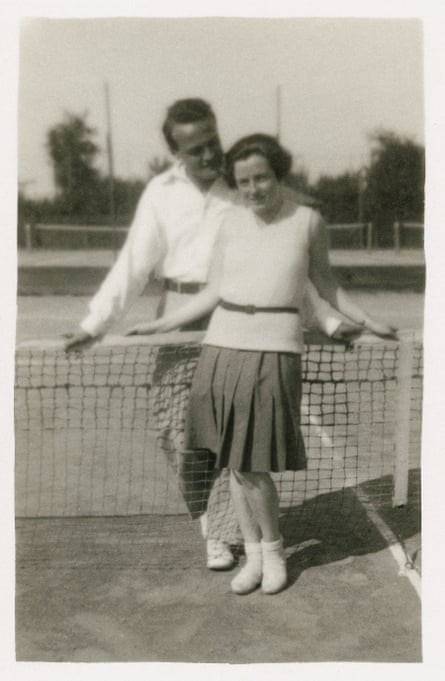A previously unknown novel by one of Europe’s most influential postwar journalists which captures the heady yet fragile spirit of the final days of the Weimar Republic has been published in Germany after his children discovered the hand-written manuscript in his desk.
More than nine decades after he wrote it, Sebastian Haffner’s Abschied or Parting has soared to the top of the Spiegel bestseller list following its debut earlier this month.
Haffner, who fled Nazi Berlin with his Jewish fiancee in 1938, achieved instant recognition in 1940 with his penetrating prewar classic Germany: Jekyll and Hyde. Winston Churchill is said to have told his cabinet to read it in order to comprehend the Nazi threat.
Haffner, who changed his name in the UK from Raimund Pretzel in order to protect family still living in Germany, went on to work as a journalist in London for the Observer. He was recognised as one of the commanding analysts of nazism and what brought Hitler to power, returning to Berlin for the Observer in 1954, and later becoming a prominent columnist for the news magazine Stern.
His son, Oliver Pretzel, 86, said his family had deliberated for years over whether to release Parting after Haffner’s death in Berlin aged 91 in 1999. They had been concerned, he said, that the work, a love story, might have seemed too slight, and overshadowed their father’s towering reputation as a heavyweight commentator.
“My sister didn’t think the novel was very good,” Pretzel, a professor of mathematics based in London, told the Süddeutsche Zeitung. “I initially shared this view somewhat. But when I re-read it and since I set about translating it into English, I suddenly realised how ingeniously constructed it is.”
Happily, the critics seem to agree. In Germany they have heaped praise on the 181-page work, calling it “a literary windfall”, an “incredibly fast-paced, light, and lively text”, and “a beautiful book of youthful sparkle and great emotional impact”.

Set on the last day of a two-week sojourn in Paris by the protagonist and his love interest, Teddy, before he has to return to a Berlin overcome by a growing sense of fear and political uncertainty, the novel was “shockingly lucid”, Marie Schmidt wrote in the Süddeutsche.
The novel reflected the same “keen historical awareness that astonished and fascinated the world” in Haffner’s other posthumous work, History of a German, she added. That book was written in 1939 but only published for the first time in German in 2000, and in English, under the title Defying Hitler, in 2002. It was praised for its clear-sighted scrutiny and credited with extinguishing the repeated assertions of Haffner’s contemporaries that they had not known about Nazi crimes.
Jekyll and Hyde was first published in Germany in 1996 under the title: 1939 – Deutschland von innen betrachtet (Germany observed from within). Both books also topped the German bestseller lists when they were published.
Haffner was 24 when he wrote Parting in just a few weeks in October and November 1932, just months before the Nazis came to power. His attempts to get it published failed.
Its narrator, Raimund, is an apprentice lawyer who smokes Gitanes Rouge and reads Aldous Huxley. In Paris in the spring of 1931 he meets Teddy, who has left Berlin, describing it as a time in which “crisis had not yet been invented”.
Teddy is thought to have been based on Gertrude Joseph, a Jewish woman from Vienna with whom Haffner had been in love. He described in his autobiographical book History of a German how she had returned to Nazi Berlin from Paris for the last time in the summer of 1933, bringing with her “an air that one could breathe, and which one breathed in greedily”. Raimund in the novel describes the growing foreboding of having to “leave for a cold Berlin”.
Haffner and Joseph, who ended up in Sweden, kept in touch until the end of their days. Twenty letters from him to her were found in her possession on her death.
In an epilogue to the novel, the literary critic Volker Weidermann says the family’s fears about its publication were unfounded.
“It [Parting] completes the historical picture that Haffner has presented to us in his … historical writings because it describes the root cause of the grief on which his later books lean, of everything of a good Germany that was lost – cosmopolitanism, tolerance, and humanity. Haffner himself repeatedly emphasised that history unfolds in private micro stories that, together, make up greater world history. In Parting he has set out this core idea.”
An English-language edition of Parting, translated by Oliver Pretzel, is expected to be published by Weidenfeld & Nicolson.

 2 months ago
71
2 months ago
71

















































